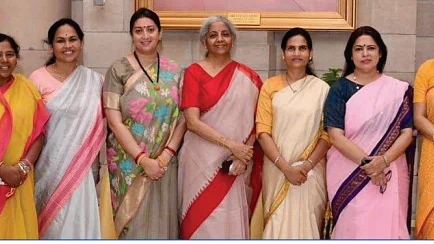The historic Women’s Reservation Bill — Nari Shakti Vandan Adhiniyam — to provide 33 per cent quota in Lok Sabha and state assemblies has been passed in Lok Sabha. It’s the first bill which was tabled in the New Parliament building and was passed to empower women in the country’s electoral process.
The bill was passed after a day-long debate with 454 votes in favour and two against it. It will be tabled in Rajya Sabha on Thursday.
Earlier during the discussion on the Women Reservation Bill, Home Minister Amit Shah said that the for some parties this bill would have been a political issue but for his party, government and his leader Prime Minister Narendra Modi, this is about empowering the women.
During the debate, various members from the opposition questioned that government’s intention for bringing the bill citing its timing for implementation after the census and delimitation exercise.
Many MPs including Sonia Gandhi, Rahul Gandhi, others also questioned the government for not including women from Other Backward Classes (OBCs). Expressing support for the women’s reservation bill in Lok Sabha, Rahul Gandhi batted for its immediate implementation and said that the legislation is “incomplete” without provision for quota for OBCs.
Union Home Minister Amit Shah appealed to the opposition to support the bill adding that if there would be any shortcomings, they can be rectified at a later date. Responding to Opposition members in Lok Sabha, Union Home Minister Amit Shah said, “After elections, soon census and delimitation exercise will take place. After this, there will be 1/3rd women in this House.”
The Modi government has been pushing for empowerment of women since the day it assumed office, he said. Women’s security, respect and equal participation have been life force of the government, he said. Shah said this was the fifth attempt to push a bill for women’s reservation.
“Why did it fail to clear hurdles earlier? First it was brought by H D Deve Gowda government in 1996. It lapsed. Second time, it was brought by the government under Atal Bihari Vajpayee. In 2008, a bill was brought by UPA. It also lapsed after the dissolution of the then Lok Sabha.
“Women have been disappointed by this Parliament on four occasions. This time I request that it be passed with unanimity. Shortcomings, if any, can be set right at a later date,” the home minister said.



